- Home
- A P Bateman
The Island (Rob Stone Book 3)
The Island (Rob Stone Book 3) Read online
The Island
By
A P Bateman
Text © A P Bateman
2016
All rights reserved
No part of this book may be reproduced, or stored in a retrieval system, or transmitted in any form or by any means, electronic, mechanical, photocopying, printing or otherwise, without written permission of the author.
Author website: http://anthonybateman1.wix.com/author-blog
Facebook: @authorapbateman
For the chance to win a signed copy of one of A P Bateman’s paperbacks keep reading at the end of this book where you will find details on how to enter.
Also by A P Bateman
The Ares Virus
The Contract Man
Lies and Retribution
The Town
Author’s note. By all means, skip on and get to the story…
My grandfather wasn’t a well man. He used to look out of his second floor window and cast his eye and opinion on all he surveyed. As a seven-year old I must have been extremely keen on my games because he once said, “That boy will never grow up, he’ll always be playing.” I certainly think that by the time I was ten, the year he died, playing still wasn’t out of the ordinary for young children in the early eighties. Maybe it was the life he lived, forced to grow up quickly to work on the family farm. Then driving a Royal Navy ambulance in World War Two wouldn’t have been too pleasant. It is worth noting though, that he was absolutely right. I have always played. Life moves on, and with it merely the need for bigger and more expensive toys. Whether that’s guns or surfboards, boats, motorcycles or cars. And then even faster cars. I love that my two young children have reached the age where I can show them the things that really matter. Showing them how to fish, or use a bow and arrow or - and certainly among all of my friends only I seem to do this - how to throw a knife into a tree from various distances. Honestly, it’s a life skill for I don’t know what.
I remember my father teaching me to swim by pretending to plant limpet mines on the sides of enemy boats (the edge of the pool) or by shooting German soldiers (sorry) with harpoon guns (pointed fingers). The game has moved on with the age we live in and my children and I now rescue dolphins or seal pups snared in drift nets or retrieve sonar data lost to the bottom of the sea. It’s certainly more fun than swim academy, that’s for sure.
I only realised recently, when it was pointed out to me while on holiday, that back-flipping into a swimming pool is not normal behaviour for a forty-five-year-old, but that’s the point – I haven’t grown up and I bloody well hope I never do. The last time I looked life could be boring and hard enough without stopping the things you love.
Writing indulges me in my quest to refrain from growing up. That I live the characters, test that some of the things I make them do is possible and plausible. Yes, it can be hard work, there are pressures like in any job and sometimes the stress of maintaining sales figures, reviews and those relentless edits can be incredible, but the actual task of getting a story to unfold is a pleasure. I miss it the moment I type the last word of the final chapter. I hope it is something I will do for as long as I have breath.
So, I’d like to thank my wife, Clair. You have encouraged me to write, selflessly given me the time to do so, listened when I’ve not really had anything to say but desperately needed to say it and told me what to ignore and what to embrace. And you keep my anti-gravity boots grounded when they need to be. Well, almost. Thank you.
1
He was quite convinced that he was dead. There would, of course, be a half-life between one world and the next. He had unwillingly visited it before. Blown out of a vehicle by an IED in Afghanistan, he had survived when others had not. He had felt the sickening weightlessness; the confusing extra-sensory perception in which to view the bleary remnants of the world he was leaving. He could hear, but heard nothing; could see, but saw only light – shadows of brightness and glister. He had seen the tunnel opening before him, a void of darkness beyond; not the warm, comforting light that he had heard other people speak of when recounting near-death experiences.
He found himself within a white void, like that he had experienced previously, only broken, burned and bloody in Afghanistan, and the only direction, like then, was towards the darkness. Maybe that was all that awaited him. Maybe that was his lot. He had killed and done bad things. As bad as anyone can do. But he had done it all for the country he served, both in times of war and in times of peace. Perhaps his journey would be different to those who talked of out of body experiences. Perhaps they had been better human beings. He had never told a soul what he had experienced. Embarrassed, sometimes ashamed that his experience had been different, and that he would be judged accordingly. Maybe his tunnel led straight to Hell. If it did, then he would still have thought he’d done his best and his fight had been just.
This experience was different though. This was the furthest he had gone towards the black void. In Afghanistan, much had culminated in him being pulled back to life, back to the known world. These factors were not here. Not this time. There were no allied trauma teams working on him here, no fast transport in a Chinook to the state of the art hospital facilities in Camp Bastion. No shock of electricity to the system from a defibrillator, no nurse talking softly in his ear throughout, squeezing his hand and assuring him he would make it. No surgeon talking his team through what they were going to try, how best to attempt the removal of the dead soldier’s bones and teeth and skull fragments from his tattered torso - turned to lethal shrapnel in a flash of blinding light and fierce heat. None of this accompanied him now, nothing or nobody tried to stop him leaving the void for the tunnel. He knew he was alone.
He was aware of heat. Burning him, tightening his skin. It felt raw. Then, as if to confuse his senses at again, a coolness washed over him. The rawness multiplied ten-fold. But he could not react to it, could not move or look to take sanctuary. The tunnel started to recede and the light gradually grew brighter. There was suddenly a splash of colour to the light; where once there had been only white, there was a yellow hue, then starburst. A dramatic show of a million silver-white dots burning his retinas and washing the yellowness away. Sound returned from the void, a gentle white-noise which washed through his ears like an attack of tinnitus.
Rob Stone opened his eyes tentatively, hampered by the sun directly overhead. He tried to shade his eyes, but his arms would not move. He could move his head and neck fractionally, but not enough to see what was tethering him. Water washed over his legs, it eased the burning, but almost instantly turned to pain, the salinity searing at his flesh. His legs would not move, and nor could he roll onto his side. He was strapped down. Would he drown? The water reached his waist, washed underneath him into the small of his back. There was a chill to it there, his underside had not been heated in the sun.
He realised he was naked. He turned his head as far as he could and looked through squinted eyes. He was on a beach. Yellow sand. A scattering of large rocks casting shadows away from him. He turned his head the other way. The process was slow, like he was suspended in treacle. He stretched, felt a stab of pain in his side. His stomach was tender. His hip hurt too, sore in the salt water. He had been injured, but had no recollection of how or when.
He studied the sight in front of him. To his left was a large outcrop of rocks and beyond that, a headland. In the foreground, tiny crabs scurried sideways into the lapping shore break and a large seabird took off, great wings flapping slowly as it skimmed the water and headed out to sea and out of his field of vision.
Stone called out for help, but his mouth and throat struggled to form the words. He let out a gargle and coughed. This induced a coughing fit, but his m
outh and throat were so dry there was no recovering from it. He coughed every few seconds, irritated that he could not stop.
Was he dreaming? He wanted to snap awake. He didn’t think he had been anywhere near the coast recently. And certainly he had not been anywhere remotely this hot. But he did not know for sure, could not remember where he had been. All that he knew was he had not been here before.
Movement came with the sudden rush of tide. The water enveloped him, washed over his stomach and into his face. He took some into his mouth and swallowed inadvertently. Almost instantly, he vomited, turned his head and found that his opposite shoulder left the wet sand and followed. Natural preservation senses had done what he and willpower alone could not, but it started him moving. It took both strength and concentration, but he managed to roll onto his side and continued to vomit on the wet sand.
After an indeterminable period of time, Stone had no idea how long, he had managed to roll onto his stomach, rest on his elbows and was able to dig his toes into the sand. The water washed over him, getting higher on the pushing tide, but he was confident that he would not drown, would get his body working before it was indeed too late.
Stone noticed the soft flesh of the inside of his left forearm. Track marks ran along the vein, which had pumped and become prominent through the exertion. He had seen needle marks before. He knew he did not do drugs, but he had no idea how they got there. But then, did he do drugs? He had no inkling who he was, what he did. He remembered being a boy and then a soldier. Was he a father and a husband? A good man, or bad?
He did not know, but he knew the track marks were wrong. His fingernails were trimmed, his muscled arms plain – not decorated with tattoos. Plenty of scars though. He started the process of getting to his feet. He rested on his knees, longer than he cared to, but necessary all the same. He looked down at his chest and stomach. Muscled and defined, broad through to trim. Again, no tattoos, but a few white scars. A burn mark and pigment discolouration. He had been injured, but over time. He transcended from kneeling, but fell short of standing. His head light, his legs heavy. He fell forwards, but steadied himself on his arms. They were strong and pushed him back up quickly. Steadier this time, but still unable to stand. He was badly dehydrated. He imagined having to urinate after waking from what he imagined to be a long and un-natural sleep, but he had no need nor inclination. He was thirsty though, unimaginably so. A flash of memory, and he sees himself in a desert environment. He is wearing an olive coloured uniform dusty and ripped, a weapon – a compact assault rifle - resting on his legs. He is drinking water from a clear plastic bottle in one hand and sucking occasionally on condensed orange syrup from a sachet in the other. He is alternating from sachet to bottle, diluting and mixing it in his mouth. The memory drives his thirst insurmountably, he looks at the ebb and flow of the sea, surging from the shore break and for a moment he contemplates drinking it. Now he knows he is in trouble. He pushed himself up and crawled up the beach to the fringe of trees and foliage. His legs and feet become lighter and the feeling returns, after a few minutes and fifty-metres, he gets up and staggers, lengthens his stride, straightens his back and grows taller, like the evolution of mankind. When he reaches the jungle he is fully formed and dangerous once more.
2
Stone knew that without water he would not last long. It may well be possible for the body to continue to function and to go on for a few days without hydration, but the brain was another consideration altogether. The brain did silly things like tell the body to take a rest, take a nap, take a deep sleep. The brain told the body they could see something in the distance, or to climb a dangerously steep and unstable cliff as a shortcut, or that the scorpion underfoot was just another twig. The brain was a thirsty son of a bitch and needed water to make decisions. And a really bad decision only had to happen once.
It was hot. Tropically so. Although his experience of the tropics, or sub-tropics ended at Florida and Louisiana. He could recall desert and military uniform, and supposed it was Afghanistan or Iraq. He knew it had been hot, hotter than here, wherever here was. His memory was akin to recalling a dream. A tangible image, but one that dispersed to mist if dwelled upon for more than a mere moment.
The sun was high. Stone estimated it to be after noon, but he didn’t know how or why he had come to the conclusion. There was an underlying subconscious to his thought processes. When he first awoke, left that no man’s land, that void of light and the dark tunnel to the unknown, whatever its significance, he could not even recall his own name. But he had started to recollect. Rob Stone. Robert did not seem to have any significance. It kind of lingered at the back of his mind, favouring Rob.
Not only was it hot, but the wind offered no respite from the heat, and what breeze wafted into his face was akin to opening an oven door. The shade of the jungle offered protection from the sun, but not from the heat. The heat became more intense, the air thicker. The jungle smelled of damp and mould. Of rotten vegetation and faeces.
He knew he needed water. His head thumped with a solid headache, pounding in time with his heartbeat. His head felt thick, his mouth dryer than cotton. He needed to ascertain where he was, and for that he needed to gain some height. The jungle seemed flat, and he could see no further than twenty-metres through the foliage. The rocky outcrop might elevate him enough to see further inland. He would walk along the beach, but first he bent down and dug up a handful of mud. There were tiny insects in the mud, but he rubbed it between his hands and started to smear it over his shoulders, around his neck and over his face. It would offer a little protection from the sun in lieu of clothing or sun-block.
And where were his clothes? Had he been partying? He couldn’t recall. He felt he wasn’t the wild partying type somehow. But then, there were the track marks in his vein. Maybe he was wrong. Maybe he partied like a rock star and fell of a boat and made it to shore before passing out. Maybe he was a rock star. He tried to remember, tried to draw on the depths and recesses of his mind and recall the day before, the day before that. Not only would the memories not come to him, but he could neither recall friends nor relatives. There was a woman. Auburn hair. She was tearful and thanking him, whispering into his ear. She kissed his cheek. As soon as he remembered, she was withering away. A dream unremembered. He closed his eyes, caught sight of a woman cradling a young man covered in blood, she seemed maternal, as if cradling her son. A sheriff’s badge on her shirt. A sadness in her eyes, a sadness he could not imagine possible. He views the scene as a voyeur, then it is gone. Dispersed and unrecallable. Was this a recent event, or an image from long ago? It frustrated him to have no knowledge of this.
As he neared the outcrop of rocks, a jutting headland, he recalled a desk, a chair, a laptop. It’s a workstation. Telephone, pens, notepad. The drawer opened, it’s his own hand opening it, he’s wearing a suit. The white shirtsleeve juts out from the black jacket. He is wearing an expensive looking watch, stainless steel, chunky. There are files in the drawer, a pistol on top, holstered. Is he a cop? He doesn’t feel that fits somehow. The memory doesn’t disperse, lingers for a moment. He lets it go, he will control this, he will attempt to recall it later. He looked at his left wrist. The watch is no longer there, but there is a faint tan line where it had been.
The headland is fifty-feet high. The gradient is steep. He can see his potential path, notes the fissures in the rock, the hand holds and pieces of jutting rock. He can see the lighter coloured rock, a seem running diagonally. He notes it is soft rock and the harder rock is pushing it out. This will create a fissure. Not now, but maybe in a thousand years. He doesn’t know how he knows this, but he feels he knows how to climb. And he does. He climbs fast, competently and within ten minutes he is standing at the top. Surveying the scene before him, out to sea to his right and back in the direction he has come from. He is in no doubt he is on an island in the tropics. And he is in no doubt he is on his own. He cannot see all of the way around, but even supposing it is a peninsular, he knows he wi
ll have to survive without help, and maybe for a long time. He breathed a deep breath and said to himself, “As tough as it gets, as long as it takes…”
3
He knew that he stood more chance of finding water at lower level. Simple physics; water ran down hill. But the jungle floor was made up of soft earth and debris, and the water would contaminate easily, become nothing more than mud. And although water was of paramount concern, if he drank bad water he would become sick, dehydrate further and spiral quickly into helplessness. There would be no coming back. He would reach a point where he became unconscious or unable to move and then he would die. How did he know this? He was not sure, but he knew he had served in the military at some point, and each time he thought about a problem, the answer seemed to drift from a recess in his mind. It was like unlocking information. He seemed to have to ask the right question for the answer to come.
The centre of the island, if indeed it was an island, looked to be twice as high as the outcrop. He estimated it at just over one-hundred feet above sea level. It plateaued, looked to have less jungle on top. It seemed to be some thousand metres distant from where he stood. He was naked, carried no machete and it was hot. He was dehydrated. His head said go for it. His survival instinct, a primordial sense rarely awakened by most people in their day-to-day existence told him to hang back. It told him it could take a day or more to reach, and that was without getting lost. The earth rotates at a thousand miles an hour. He recalled being aware that when the horizon is not visible, people always veered left because of this fact. He may well miss the mount altogether. Where had he heard this? He remembered a Gunnery Sergeant, weathered and grey and as tough as hell. He remembered looking up at him, one of a number of men lying prone, heavy .50 calibre sniper rifles in front of them. The gunny talked of the curvature of the earth, allowing for the earth’s rotational spin, the pull of gravity. That without wind, long shots dropped left and low. Left was always the easier path to take.

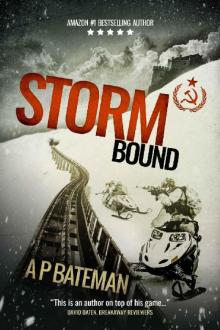 Stormbound
Stormbound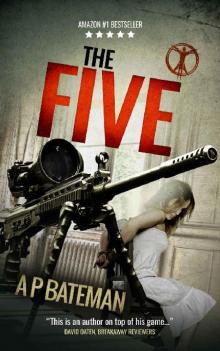 The Five
The Five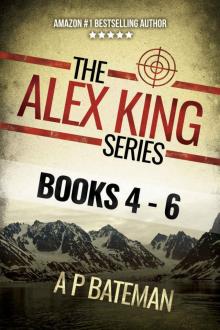 The Alex King Series
The Alex King Series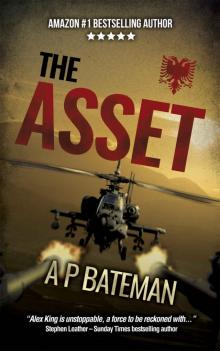 The Asset (Alex King Book 10)
The Asset (Alex King Book 10)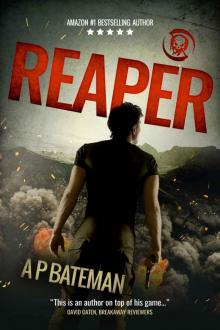 Reaper
Reaper Breakout
Breakout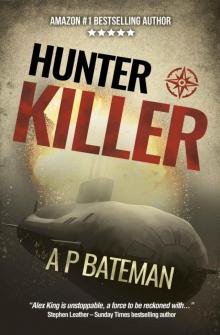 Hunter Killer - Alex King Series 12 (2021)
Hunter Killer - Alex King Series 12 (2021)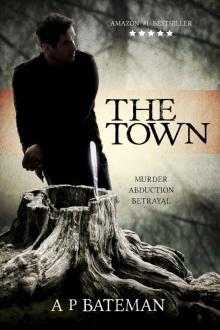 The Town (Rob Stone Book 2)
The Town (Rob Stone Book 2)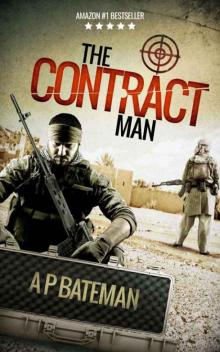 The Contract Man
The Contract Man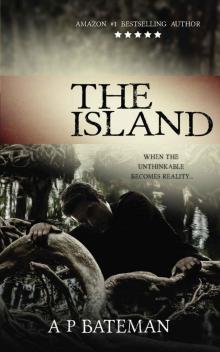 The Island (Rob Stone Book 3)
The Island (Rob Stone Book 3)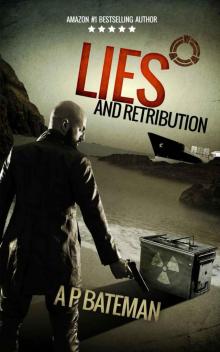 Lies and Retribution (Alex King Book 2)
Lies and Retribution (Alex King Book 2)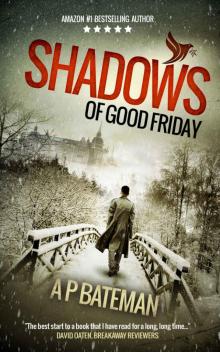 Shadows of Good Friday (Alex King Book 3)
Shadows of Good Friday (Alex King Book 3)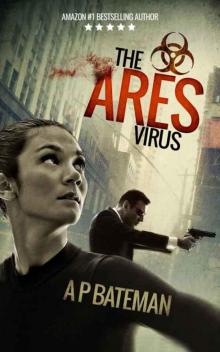 The Ares Virus
The Ares Virus